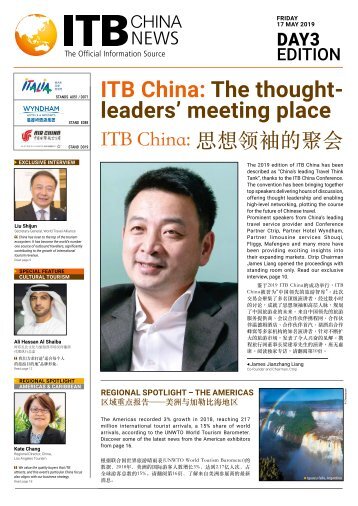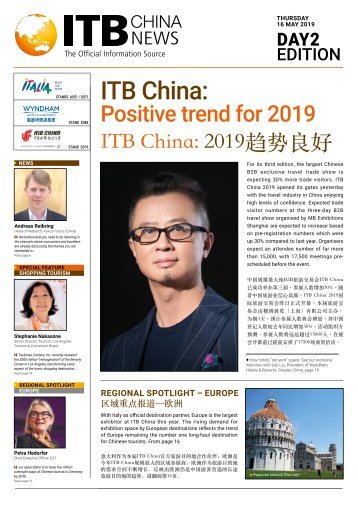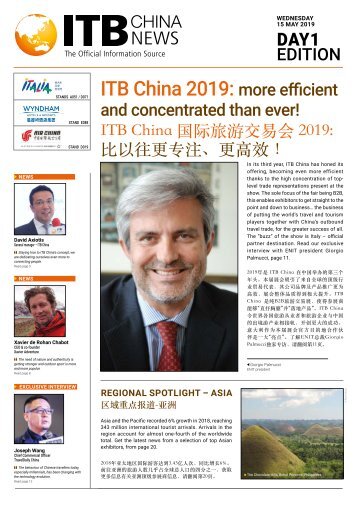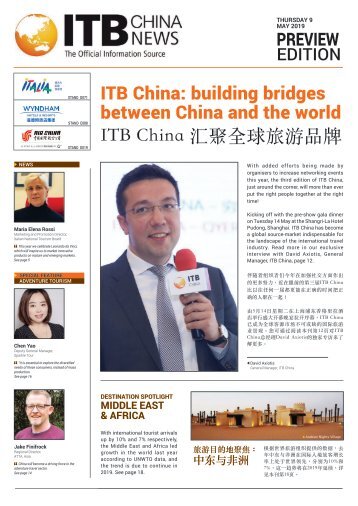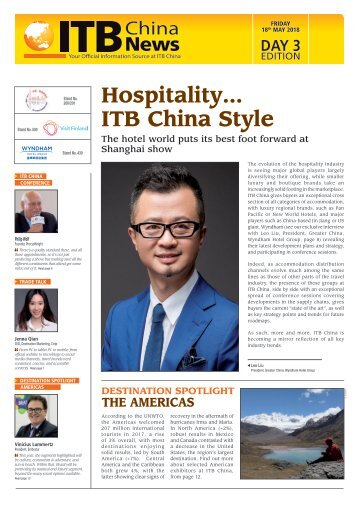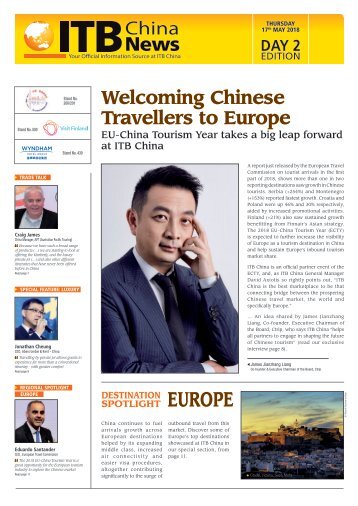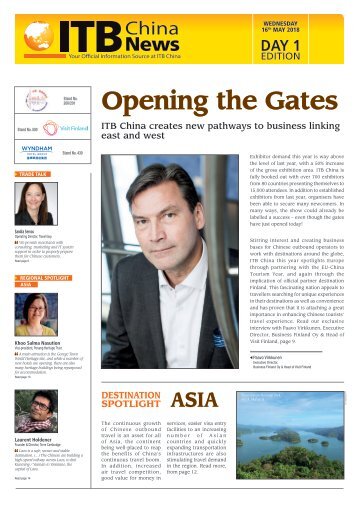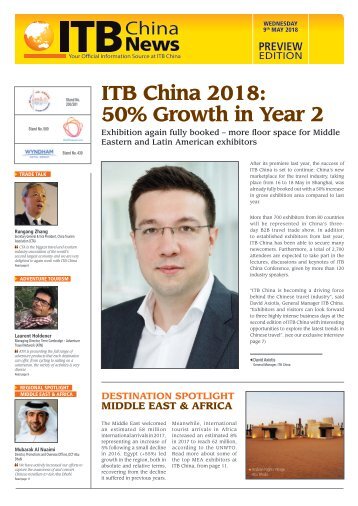ITB China News 2019 - Day 3 Edition
- Text
- Tourism
- Travellers
- Cultural
- Bahamas
- Outbound
- Destination
- Destinations
- Americas
- Arrivals
- Products
- Www.cleverdis.com
10 EXCLUSIVE INTERVIEW
10 EXCLUSIVE INTERVIEW PAYMENT FOR GOODS AND SERVICES IS BECOMING A MAJOR ISSUE FOR FOREIGN VISITORS TO CHINA James Jianzhang Liang Co-founder and Chairman, Ctrip Correcting the tourism trade balance Exclusive Interview: James Jianzhang Liang, Co-founder and Chairman, Ctrip. James Jianzhang Liang is back at ITB China this year, where he addressed a “standing room only” conference on innovating in dealing with demographics; but also made some hard-hitting points about China’s tourism trade deficit. We asked him to tell us more. Much of China’s trade surplus in physical goods is being offset by a deficit in tourism. The trade surplus in goods amounts to US0bn, but the trade deficit in tourism is around US0bn. On a global perspective, when one talks about trade, and the contribution of tourism to different nations’ economies, Chinese outbound tourists are major contributors. China has a huge potential to develop inbound business, but there is a continuing trend for outbound tourism to outgrow inbound by a big margin, and this could eventually lead to an overall trade deficit, which would have a very important impact on the economy. What do you suggest should be done to rectify this? Ctrip cannot fix this problem alone. There are a lot of issues that need to be dealt with. The facilitation of visas is one area where things could be further improved. We can help to some extent when it comes to helping people with their applications and so on. But payment for goods and services is becoming a major issue for foreign visitors to China, as China has gotten rid of cash, and most Chinese people pay with their phones. The issue arises where foreigners cannot link their bank cards to China’s mobile payment systems. There are some regulatory issues, and the Chinese financial regulators need to be more relaxed in this area, in order to allow tourists to have more access to electronic payment systems here. While some merchants accept cards like Visa or Mastercard, more and more only take cash or mobile payment. We believe that if operators like ourselves, or WeChat Pay, can be linked to foreign bank cards, this could greatly facilitate travel for overseas visitors. You’re talking about a deficit, and in your presentation, you showed examples of other countries that had issues in this respect. Where is China situated on that sliding scale? In terms of absolute trade deficit in tourism, China’s deficit is bigger than all the others combined. In terms of percentage of GDP, China is ranked 11th, behind some of the countries that have internal problems, like Sudan or the Palestinian territories, because not many people want to go there. But there are also some rich oil producing countries like Kuwait that have a tourism trade deficit. Even some nations like Norway have a percentage deficit that is higher than China. But overall, most countries are in a better situation than us when it comes to the tourism balance of trade in terms of percentage GDP. What percentage of GDP is made up of inbound tourists to China? It’s 1.7% net in China. One can compare that to Thailand, where it’s 10% net. Should China be doing more external promotion to arrive at this point? Yes. There is a problem to be solved, but there is also a perception issue. So, work needs to be done on promotion, spending more on social media and other advertising means, to promote destinations here. You’ve been very involved with ITB China since the start. Why is this show so important for you? I believe ITB China is the biggest trade show for the tourism industry in China, and it’s also here where our headquarters are! This is where most of the activity comes from, as this is the biggest source region in China for outbound tourists. That means all our partners and friends come here, and it’s a great opportunity to meet and do business. Messe Berlin have been running major trade events for many years, and they have been able to replicate this success very well in China ITB CHINA NEWS • Friday 17 th May 2019 www.itb-china-news.com
SPECIAL FEATURE: CULTURAL TOURISM 11 Culture Counts: CTS calls for expansion of offering While Chinese travellers are known to like food, art exploration, architecture, music, and of course shopping, China’s CTS Travel says it is time companies focusing on cultural travel expand their offerings for Chinese travellers. CTS is one of the largest state-owned travel agencies in China, with presence in all cities in the country as well as 15 countries across the world. “Travel is dominated by culture”, says Chen Zhuo, General Manager of Europe Division & Cultural Travel Division at CTS Shanghai. “In the future, Chinese and even global travellers will prefer more informative trips.” Schedules and itineraries, says Mr Chen, need to be increasingly customised depending on the specific interests of the Chinese visitors. The use of technology can also add real value. Mr Chen says artificial intelligence technology is helping people interact with others in a simple manner, as, thanks to live translation devices, Chinese travellers can ask a question in Chinese, and have it directly translated to English… and vice versa. This trend of facilitating Chen Zhuo General Manager of Europe Division & Cultural Travel Division, CTS Shanghai instructions in Chinese and the presence of Chinese-speaking guides, along with apt use of online tools is making a trip more enjoyable. “Translation gadgets, videos and virtual reality will all work well,” said Mr Chen, who added that CTS’s strength lies in offering a combination of cultural content and outstanding guides Li MengRan Communication manager, Utour SHOPPING? NO THANKS. WE WANT CULTURE… According to Chinese tour operator utour, the image of the Chinese tourist as only seeking shopping destinations and iconic landmarks is quickly disappearing. As an established outbound travel operator in China, utour has focused on a wide range of cultural travel products, in which art exploration, architecture, human history and music are the main interests. Utour’s communication manager Li MengRan says shopping might well be a primary reason for travelling to Hong Kong or Macau, but not for destinations in Europe or North America. Israel: official Culture Travel Partner of ITB China 2019 and become culture travel partner at ITB China 2019,” said Bora Shnitman, Israel Tourism Attaché in China, adding, “Israel is well known in China as an attractive destination for those travellers who are looking for unique and unforgettable cultural experience”. Li points to a recent McKinsey report, which indicates that Chinese now show a penchant for “experiences”, and have increasingly diverse travel needs. Exploring local events, cuisine, art and so on, are now high on the agenda. And the global fraternity serving travellers from China is evolving accordingly. “With the explosive growth of outbound tourists from China, more countries are upgrading their services to Chinese travellers by providing Chinese instructions and Chinese-speaking guides,” says Li. The Israeli Ministry of Tourism is the official culture travel partner of the third edition of ITB China. “This is the second consecutive year that Israel Ministry of Tourism is taking part in ITB China and we are proud to enhance our collaboration with the organisers “This year our annual theme is ‘Promised land, made with wisdom’. We would like to introduce to Chinese travellers the great diversity that Israel has to offer to its visitors, from ancient history and culture to advanced innovative technologies and ideas,” adds Schnitman. “In addition, during ITB China, we will be presenting new cultural travel products to visitors and looking forward to fruitful cooperation with our new and old Chinese partners” STAND B001 According to utour statistics, the main audience of cultural travel products is mainly middle-aged and old-age tourists. In addition, white-collars and office workers in Tier 1 cities are also the mainstay consumers. “They often expect to meet their needs of seeking knowledge through travel and thus enrich their inner spiritual world. Moreover, they are willing to explore local customs and traditions through unique environment and scenes of the destinations. Tourists with rich experience in outbound travel prefer cultural travel. For these travellers, travel not only is a trip, but also meets the mental pursuit in the heart.” said Li ITB CHINA NEWS • Friday 17 th May 2019
- Page 1: The Official Information Source FRI
- Page 7 and 8: 新 闻 7 ADVERTORIAL JTB 为 中
- Page 9: EXCLUSIVE INTERVIEW 9 THE WORLD TOU
- Page 13 and 14: 特 色 报 道 : 文 化 旅 游 1
- Page 15 and 16: 特 色 报 道 : 展 会 活 动 1
- Page 17 and 18: AMERICAS & CARIBBEAN REGION 17 A
- Page 19: HALL PLAN 展 馆 平 面 图 STAND
Inappropriate
Loading...
Mail this publication
Loading...
Embed
Loading...


